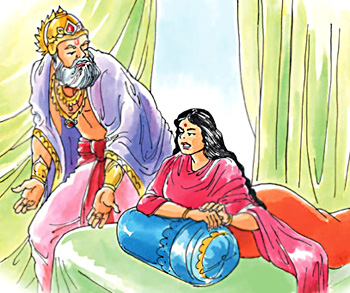 The Dilemma of King Dasaratha is included in the Ayodhya Kanda. Dasaratha, the king of Ayodhya, was in a dilemma when he heard about the tow boons of his queen Kaikeyi. Earlier, Dasaratha`s life was saved by Kaikeyi during a war with the Asuras and Dasaratha offered the queen with two boons which the queen reserved for the future. When Kaikeyi got the news of Rama`s coronation to the throne of Ayodhya from her evil-minded maid-servant Manthara and after her continuous evil counsel, Kaikeyi became furious and desired her son Bharata to be the king of Ayodhya and the banishment of Rama to the jungle for fourteen years. After hearing this from Kaikeyi Dasaratha became speechless and was in a severe dilemma of whether to keep his words given to Kaikeyi or the coronation of his beloved son Rama.
The Dilemma of King Dasaratha is included in the Ayodhya Kanda. Dasaratha, the king of Ayodhya, was in a dilemma when he heard about the tow boons of his queen Kaikeyi. Earlier, Dasaratha`s life was saved by Kaikeyi during a war with the Asuras and Dasaratha offered the queen with two boons which the queen reserved for the future. When Kaikeyi got the news of Rama`s coronation to the throne of Ayodhya from her evil-minded maid-servant Manthara and after her continuous evil counsel, Kaikeyi became furious and desired her son Bharata to be the king of Ayodhya and the banishment of Rama to the jungle for fourteen years. After hearing this from Kaikeyi Dasaratha became speechless and was in a severe dilemma of whether to keep his words given to Kaikeyi or the coronation of his beloved son Rama.
Then Dasaratha was overpowered by grief and swooned away, and, coming to himself again, he prayed Kaikeyi to waive her right. For long he pleaded with her, weeping heavy tears and thinking all an evil dream; but Kaikeyi only answered with exhortations to keep his sworn word, continuously reminding him of many ancient exemplars of truth, like Saivya, who gave his own flesh to the hawk that pursued the dove he had protected, or Alarka, that gave his eyes to a Brahman. She then told Dasaratha that if he would not keep his words then he would be disgraced for ever and she would give up his life.
At dawn Vashishtha sent the charioteer of Rama to inform the king that all was ready for the ceremony. Hardly able to say anything out of grief, the king sent that charioteer to fetch Rama to his side. So leaving Sita with happy words, Rama drove through the gay streets to his father`s palace; those who had not the fortune to see Rama, or to be seen by him, despised themselves, and were despised by all.
Rama greeted the king and Kaikeyi dutifully, but Dasaratha, altogether broken down and crushed to earth, could only murmur faintly his son`s name. Grieved at heart, Rama wondered if he had done anything wrong or if any misfortune had befallen his father. He thus enquired about the situation from his mother Kaikeyi. She then told everything regarding the tow boons given to her by his father long ago and that she now wanted the two boons in the form of Bharata`s coronation and Rama`s exile into the forest for fourteen years. After hearing this from Kaikeyi Rama was not angered but requested his mother to send messengers to call Bharata and he took her permission to meet Sita and his mother Kaushalya and thus left the place along with Lakshmana.
Rama met his mother and informed her about everything that had happened. After hearing all this from Rama, Kaushalya like a great sal tree felled by the woodman`s axe, sank to the ground and wept inconsolably. Kaushalya asked Rama to take her to the jungle along with him and Lakshmana, filled with anger, wanted to fight for Rama and blamed his father. Rama was totally unmoved by the lust for empire and he told his mother to serve his father when he goes to the forest and told Lakshmana that there was neither any fault in his father nor there any in Kaikeyi, every thing happened according to destiny and what is there in the destiny needs to be obeyed perfectly. He also asked his mother Kaushalya to serve his father and honour the gods and Brahmins when he is in the forest.
Then Kaushalya was calmed and blessed her son, commending him to the gods and rishis and trees and mountains and deer of the forest and all creatures of the sky to guard him. Then with Brahman ritual and sacred fire she blessed his going and walked sun wise thrice about him, and he went to Sita. Sita, who knew nothing of what had befallen, rose and greeted Rama with trembling limbs and Rama could no longer hide his grief and told her all that had been done, and informed her that Bharata would be the king of Ayodhya and he had planned to move away to the forest. He told Sita to rise early in the morning and bow to the feet of his father Dasaratha, and honour his mother Kausalya, and also his other mothers with equal love and affection and look on Bharata and Shatrughna as sons or brothers, since they are dearer to him than his own life. Thus, Rama tried his best to help his father Dasaratha move out of the Dilemma and made up his mind to go to the forest for fourteen years and the coronation of Bharata to the throne of Ayodhya.












